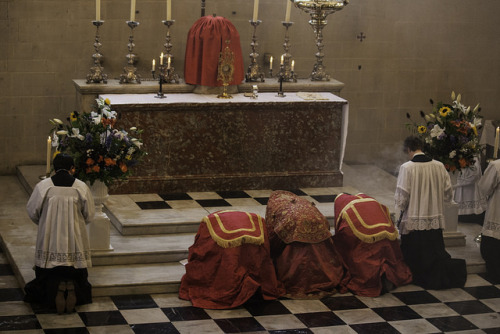HOMILY for 3rd Wed of Easter
Acts 8:1-8; Ps 65:1-7; John 6:35-40

We continue to read from St John’s discourse on the Eucharist today. The Lord had been asked by the people for a sign so that they might believe in him, and Christ responds that the life-giving Bread from Heaven is the sign. When the people ask for this bread, Jesus then declares, as we read today, that he is the “bread of life” which has “come down from heaven” (Jn 6:35, 38). This declaration that he has come down from heaven will engage the people; they object to this in tomorrow’s passage.
But Jesus’ coming down from heaven should catch our attention too because, as he says earlier in John’s Gospel: “No one has ascended into heaven but he who descended from heaven” (Jn 3:13). So, in saying that he has come down from heaven, we’re reminded of this: Christ will ascend to heaven forty days after Easter. The significance of this for us is that Christ now promises that we will ascend with him. He says: “I will raise him up at the last day” (Jn 6:40). The meaning of this isn’t so much about the resurrection of all the dead to judgement, but it is about rising to share in Christ’s life in heaven. It is about being raised beyond our human natures to share in Christ’s divine nature; it’s about being united to the Blessed Trinity in love. And the way God accomplishes this – our divinization – is through the Eucharist. For as St Augustine says, through the Eucharist, this Sacrament of divine Love, Christ will transform us into himself.
The Eucharist, however, is the logical, and even necessary, outcome of Christ’s sacrifice on the Cross. Because it is through the Mass that the redemption Christ won for Mankind once and for all on Calvary is applied to humanity through the ages. As the Catechism says, the sacrament, therefore, perpetuates the sacrifice of the Cross so that we can receive the effects of Christ’s redeeming love, that is, be saved and raised to the new life of Easter (cf CCC 1323). In today’s Gospel, Jesus expresses this by saying: “I should lose nothing of all that [the Father] has given me, but raise it up on the last day” (Jn 6:39). For all that the Father has given the Son refers to Christ’s redeeming work on the Cross, and nothing is lost but is raised up if they receive the Eucharist, and so come, at last, to share in the divine life of God. Hence, St Ignatius of Antioch referred to the Eucharist as “the medicine of immortality, the antidote for death, and the food that makes us live for ever in Jesus Christ”.
But what about the final section of today’s Gospel? Jesus says: “every one who sees the Son and believes in him should have eternal life; and I will raise him up on the last day” (Jn 6:40). Now, unlike the people Christ is speaking to in the Gospel we cannot actually see Jesus physically, but if the Lord says this, then he must mean that we can see him in a different way than just literally and physically; with faith in the Eucharist we see Christ sacramentally. For he is here, truly present and with us in the Blessed Sacrament. So, the reason we adore the Lord on our Altars – as we do after Mass today – is so that we can see him more clearly, so that we may believe more deeply that he is here as he has promised, so that we can reflect more profoundly on what we do when we go to Mass and receive Holy Communion.
As Pope Benedict XVI said: “The act of adoration outside Mass prolongs and intensifies all that takes place during the liturgical celebration itself”. Indeed, St Augustine even said “no one eats that flesh without first adoring it; we should sin were we not to adore it”. So, as Christ tells us, if we see him and believe in him we shall have eternal life and be raised at last to glory with him. If we think about it, isn’t this what we anticipate – heavenly life – when we adore the Lord in the Eucharist and spend time here with him?
 peterapostle reblogged this from anastpaul
peterapostle reblogged this from anastpaul anastpaul reblogged this from lawrenceop
autijacen liked this
lawrenceop posted this